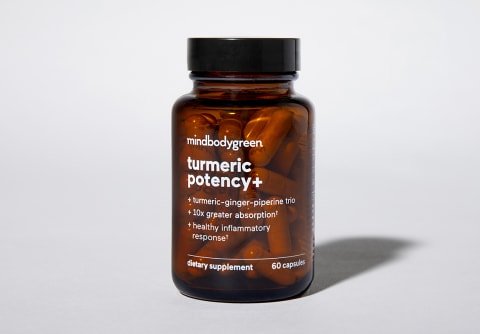Advertisement
Looking To Boost Turmeric's Health Benefits? Consider A Daily Supplement


Ashley Jordan Ferira, Ph.D., RDN is Vice President of Scientific Affairs at mindbodygreen. She received her bachelor's degree in Biological Basis of Behavior from the University of Pennsylvania and Ph.D. in Foods and Nutrition from the University of Georgia.

If you've paid attention to the wellness world over the past 20 years, you know that turmeric is a wildly beneficial and famed spice, thanks to its variety of uses in the kitchen and ability to promote whole-body health.
This powerful Ayurvedic spice that gives golden milk its bright, sunshiny hue has been used for thousands of years as an herbal remedy. Its rich amber color makes turmeric easy to pick out in your spice drawer and turns everything it touches (from clothes to countertops to fingers) an almost neon yellow.
But, as I'm sure you already know, staining clothes and flavoring curry isn't all this ancient herb can do. Turmeric's known benefits—which include anti-inflammatory actions, antioxidant properties, and general support for whole-body health—have convinced some to incorporate the spice into their daily routine.*
This raises the question: What's the difference between having a golden milk latte, turmeric tea, or delicious curry and taking this spice-drawer icon in the form of a daily turmeric supplement? Let's take a look at the unique features of turmeric that make daily supplementation beneficial.
What is turmeric?
Turmeric comes from the rhizome, or underground stem, of the plant Curcuma longa. (Technically, a rhizome is a bit different from a root, but it seems people use the terms interchangeably.) It's also a member of the ginger family (Zingiberaceae).
The most bioactive and beneficial components of turmeric are compounds called curcuminoids. Curcumin is the most well known (and researched) of these curcuminoids; however, there are many phytonutrients found in turmeric that contribute to the herb's holistic health benefits.
How turmeric supports whole-body health.
Turmeric has been used for approximately 4,000 years in Eastern medicinal practices for its whole-body benefits. Over the past 30 years or so, Western research has been trying to catch up with the time-tested traditional uses of the Ayurvedic spice.
Turmeric supports cells, organs, and organ systems in order to enhance their physiological functions. Its ability to nurture a healthy inflammatory response (its most famous benefit), plus its major antioxidant actions, contribute to serious health benefits across the skin, gut1, brain, immune system, and more.*
Indeed, turmeric has been shown to modulate proinflammatory molecules2, combat oxidative stress3, and demonstrate cardioprotective and neuroprotective4 properties; plus, it's one of the top supplements to support your mood, boost energy, and even balance your hormones.*
The ancient herb's powerful antioxidant properties also make it ideal for supporting skin health—you can even apply it topically in the form of a DIY turmeric face mask to help brighten your skin.
If you're an avid exerciser, you might want to include a full-spectrum turmeric supplement in your workout routine: It's been shown to improve muscle performance and recovery, making it a viable supplement for active lifestyles5.*
Thanks to this long list of benefits spanning the entire body (after all, this hero botanical is working at the cellular level), it's also a supreme supporter of longevity—and a long life of feeling our best is all we can really ask for, right?
Do I need a daily turmeric supplement?
You may be asking why you would need a turmeric supplement when you can just incorporate the spice into your daily life (golden milk latte on Monday, curry on Tuesday, etc.).
While using turmeric to spice up your dishes and drinks is still a fantastic and delicious option, we need to consume quite a bit of the herb (approximately 6 to 9 teaspoons!) to reap the concentrated benefits a daily bioavailable supplement can provide.
This is because curcumin is notoriously difficult to absorb. "Curcumin can be variable within the spice form," says clinical dietitian Huma Chaudhry, R.D., LDN. "If you want a more targeted solution for your specific health concern, a turmeric supplement can be a quick and concentrated way to get that support,"* she adds.
The key advantage of a supplement is the enhanced bioavailability. For example, Acumin™ (the form of full-spectrum turmeric root extract featured in mbg's turmeric potency+) is a unique formulation that uses polar-nonpolar-sandwich (PNS) technology6, which allows for curcumin and other curcuminoids to pass through the intestinal wall more easily, so it can be properly absorbed and used throughout the body.*
Thanks to this cutting-edge PNS technology, Acumin™ allows for 10 times the bioavailability of regular turmeric!*† (That's something you just can't get from your golden milk.)
Turmeric as a spice is still viable and supports holistic well-being, but supplementation is a simple and effective way to ensure you're getting these important benefits each and every day.
What to look for in a turmeric supplement.
Three things are important when it comes to an ideal turmeric supplement: effective dosage, optimal bioavailability, and frequency of intake. A daily turmeric supplement that prioritizes these criteria will give you the best chance of experiencing turmeric's many benefits.
For dosage, look for at least 500 milligrams. According to registered dietitian Jess Cording, M.S., R.D., CDN, anywhere from 500 to 2,000 milligrams of turmeric can deliver benefits. And just to clarify: This doesn't mean 2,000 milligrams is better. In fact, a 500-milligram turmeric supplement with optimized bioavailability is a bigger bang for your buck (less is more).
As we mentioned above, curcuminoids typically have poor bioavailability—they're metabolized fast and often eliminated by the body before you have a chance to use them. The delivery method and supplement formula can ensure optimal bioavailability.
Some forms of turmeric can benefit from a buddy botanical: black pepper. For those formulas, to help deliver curcumin in a form that's easily absorbable (and usable in your body), look for piperine (from black pepper extract) in the list of ingredients.
If you're familiar with eating turmeric for your health, you may have heard about this turmeric and black pepper pairing. This is because the bioactive compound piperine in black pepper helps to enhance the bioavailability of curcuminoids.*
Lucky for you, mbg's turmeric potency+ checks off both of these boxes with synergistic botanical ingredients ginger root extract and piperine alongside full-spectrum turmeric root extract (as Acumin™) to help you reap turmeric's vast, whole-body benefits.*
The takeaway.
Taking a daily turmeric supplement best enables you to reap the brilliant benefits of this long-used Ayurvedic herb. A high-quality turmeric supplement ensures optimal bioavailability, so each dose you take brings you closer to the wonders of this loved golden spice.
mbg's turmeric potency+ uses ingredients of the highest quality and bioavailability, so you can worry less about how much your gut is absorbing and more about enjoying your day and your golden milk.
† Acumin™ research has demonstrated superior bioavailability, curcuminoid serum response, and stability compared to other common forms of turmeric root extract (e.g., volatile oil, phospholipid/liposomal, and standard 95% curcumin).
6 Sources
- https://www.ncbi.nlm.nih.gov/pmc/articles/PMC3882399/
- https://www.ncbi.nlm.nih.gov/pmc/articles/PMC3604998/
- https://www.sciencedirect.com/science/article/pii/S1756464615000092?via%3Dihub
- https://www.ncbi.nlm.nih.gov/pmc/articles/PMC7522354/
- https://pubmed.ncbi.nlm.nih.gov/32109179/
- https://www.sciencedirect.com/science/article/pii/S0928493117305854?via%3Dihub
Watch Next
Enjoy some of our favorite clips from classes
Enjoy some of our favorite clips from classes
What Is Meditation?
Mindfulness/Spirituality | Light Watkins
Box Breathing
Mindfulness/Spirituality | Gwen Dittmar
What Breathwork Can Address
Mindfulness/Spirituality | Gwen Dittmar
The 8 Limbs of Yoga - What is Asana?
Yoga | Caley Alyssa
Two Standing Postures to Open Up Tight Hips
Yoga | Caley Alyssa
How Plants Can Optimize Athletic Performance
Nutrition | Rich Roll
What to Eat Before a Workout
Nutrition | Rich Roll
How Ayurveda Helps Us Navigate Modern Life
Nutrition | Sahara Rose
Messages About Love & Relationships
Love & Relationships | Esther Perel
Love Languages
Love & Relationships | Esther Perel
What Is Meditation?
Box Breathing
What Breathwork Can Address
The 8 Limbs of Yoga - What is Asana?
Two Standing Postures to Open Up Tight Hips
How Plants Can Optimize Athletic Performance
What to Eat Before a Workout
How Ayurveda Helps Us Navigate Modern Life
Messages About Love & Relationships
Love Languages
Advertisement

This Little-Known Supplement Helps Women Sleep & Decreases Signs Of Depression
Molly Knudsen, M.S., RDN

This Little-Known Supplement Helps Women Sleep & Decreases Signs Of Depression
Molly Knudsen, M.S., RDN
















